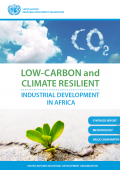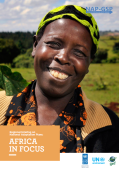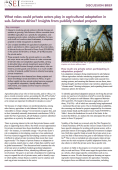Adequate, appropriate finance is crucial for Africa’s sustainable development. Its availability depends on African countries developing financial systems that can effectively draw on and deploy to best use domestic and international, private and public sources. With the growing importance, in particular, of both domestic sources of finance, and private investment (both domestic and international), it is critically important that Africa’s financial and capital markets develop in ways that will promote sustainable development on the continent.
Aligning a financial system with sustainable development does not happen automatically. The increasing scale and sophistication of Africa’s financial system alone will not achieve it. Indeed, the international evidence amply demonstrates that financial and capital markets can — and often do — become detached and fail to adequately serve the long-term needs of inclusive sustainable development.


Restoration of degraded land can create vast bioenergy crop potential, without constraining food crops or other land use options. This presents an important opportunity for African countries to develop modern, sustainable bioenergy from rapidly growing wood crops at the same time as pursuing ambitious forest landscape restoration initiatives.
Bioenergy from Degraded Land in Africa: Sustainable and technical potential under Bonn Challenge pledges presents a methodology to estimate the sustainable energy potential from land restoration in line with the Bonn Challenge, particularly as it relates to African countries. (The Bonn Challenge is a global effort to bring 150 million hectares of the world’s deforested and degraded land into restoration by 2020, and 350 million hectares by 2030.)
The African Forest Landscape Restoration initiative, AFR100, has set out to collect pledges to restore 100 million hectares of degraded land, mostly in in sub-Saharan Africa. To date, 18 countries have pledged to restore 75 million hectares.

